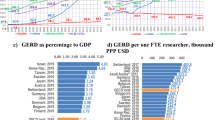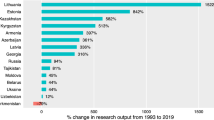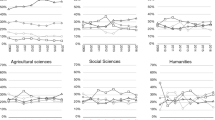Abstract
After developing independently following World War II, the research systems of East and West Germany reunited at the end of the Cold War, resulting in Westernization of East German Research institutions. Using data from the Web of Science over the 1980–2000 period, this paper analyses the effects of these political changes on the research activity of scholars from East and West Germany before and after the reunification. It shows that these groups differ in terms of levels of production, publication language, collaboration patterns and scientific impact and that, unsurprisingly, the scholarly output of the East became much more similar to that of the West after the reunification. At the level of individual researchers, analysis shows that East German researchers who had direct or indirect ties with the West prior to the 1990s were less affected by the reunification, or were perhaps quicker to adapt to this major change, than their colleagues who were more deeply rooted in the Eastern research system.




Similar content being viewed by others
Notes
There is a multiplicative effect caused by the assignation of multiple disciplines to some researchers. Thus, the total number of authors in Table 1 is larger than the number of distinct researchers.
“Eastern countries” refers to: Albania, Armenia, Azerbaijan, Bosnia and Herzegovina, Bulgaria, Belarus, China, Croatia, Cuba, Czechoslovakia, Czech Republic, Estonia, German Democratic Republic, Hungary, Kazakhstan, Kyrgyzstan, Latvia, Lithuania, Macedonia, Moldova, Montenegro, Poland, Republic of Georgia, Romania, Russia, Serbia, Serbia and Montenegro, Slovakia, Slovenia, Tajikistan, Turkmenistan, Ukraine, USSR, Uzbekistan, Yugoslavia.
“Western countries” refers to: All countries not comprised in the aforementioned definition of Eastern countries.
It should be noted that the East–West mobility of German researchers might slightly inflate their collaboration with East–West countries. For example, collaborations with the West of a GDR researcher who, himself, moved to the West will be counted as a collaboration between the West and the GDR.
References
Archambault, É., Vignola-Gagné, É., Côté, G., Larivière, V., & Gingras, Y. (2006). Benchmarking scientific output in the social sciences and humanities: The limits of existing databases. Scientometrics, 68(3), 329–342.
Caron, E., & van Eck, N. J. (2014). Large scale author name disambiguation using rule-based scoring and clustering. In E. Noyons (Ed.), Proceedings of the 19th international conference on science and technology indicators (pp. 79–86). Leiden: CWTS-Leiden University Leiden.
Connelly, J. (1999). The foundations of diversity: Communist higher education policies in Eastern Europe, 1945–1955. In K. Macrakis & D. Hoffmann (Eds.), Science under socialism, East Germany in comparative perspective (pp. 125–139). Cambridge, MA: Harvard University Press.
Czerwon, H.-J. (1995). The research landscape in East Germany after the reunification—A bibliometric analysis. In M. E. D. Koenig & A. Bookstein (Eds.), Proceedings of the fifth biennial conference of the international society for scientometrics and informetrics (pp. 113–117). Medford, NJ: Learned Information.
Grupp, H., & Hinze, S. (1994). International orientation, efficiency of and regard for research in East and West Germany: A bibliometric investigation of aspects of technology genesis in the united Germany. Scientometrics, 29(1), 83–113.
Grupp, H., Schmoch, U., & Hinze, S. (2001). International alignment and scientific regard as macro-indicators for international comparisons of publications. Scientometrics, 51(2), 359–380.
Hechler, D., & Pasternack, P. (2014). From transformation to transfer: The transformation of the East German academic system 1989/90–1995. Revue d’études comparatives Est-Ouest, 45(1), 207–227.
Hohlfeld, R. (1999). Between autonomy and state control: genetic and biomedical research. In K. Macrakis & D. Hoffmann (Eds.), Science under socialism, East Germany in comparative perspective (pp. 247–265). Cambridge, MA: Harvard University Press.
Kahn, P. (1993). Reunification: scientists in the East count the costs. Science, 260(5115), 1744–1746.
Macrakis, K. (1999). Introduction: Interpreting East German science. In K. Macrakis & D. Hoffmann (Eds.), Science under socialism, East Germany in comparative perspective (pp. 1–22). Cambridge, MA: Harvard University Press.
Meyer-Krahmer, F. (1990). Science and technology in the Federal Republic of Germany. Harlow, Royaume-Uni: Longman.
Mongeon, P., & Paul-Hus, A. (2016). The journal coverage of web of science and scopus: A comparative analysis. Scientometrics, 106(1), 213–228.
Nötzoldt, P. (1999). From German academy of science to socialist research academy. In K. Macrakis & D. Hoffmann (Eds.), Science under socialism, East Germany in comparative perspective (pp. 140–157). Cambridge, MA: Harvard University Press.
Ruiz-Castillo, J., & Costas, R. (2014). The skewness of scientific productivity. Journal of Informetrics, 8(4), 917–934.
Sabel, B. A. (1993). Science reunification in Germany: A crash program. Science, 260(5115), 1753–1758.
Sietmann, R. (1991). Reunification blues for East German scientists. Science, 253(5020), 619.
Stankus, T. (1996). The journals of German university and engineering school scientists before and after national reunification. Science & Technology Libraries, 16(1), 35–47.
Warlimont, H. (1995). Reorganizing a major materials research institute in East Germany—IFW Dresden. Advanced Materials, 7(3), 259–262.
Acknowledgements
The authors would like to thank the two anonymous referees for their precise and constructive comments, as well as Rodrigo Costas from the Centre for Science and Technology Studies (CWTS) for his help with the disambiguation of the Web of Science authors.
Author information
Authors and Affiliations
Corresponding author
Rights and permissions
About this article
Cite this article
Archambault, A., Mongeon, P. & Larivière, V. On the effects of the reunification on German researchers’ publication patterns. Scientometrics 111, 337–347 (2017). https://doi.org/10.1007/s11192-017-2254-9
Received:
Published:
Issue Date:
DOI: https://doi.org/10.1007/s11192-017-2254-9




